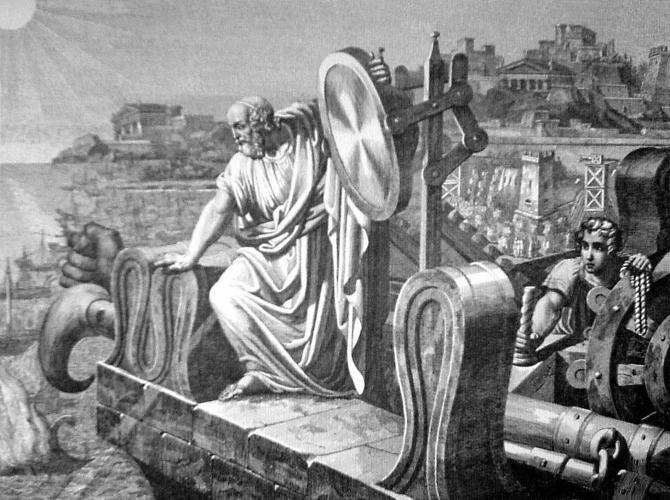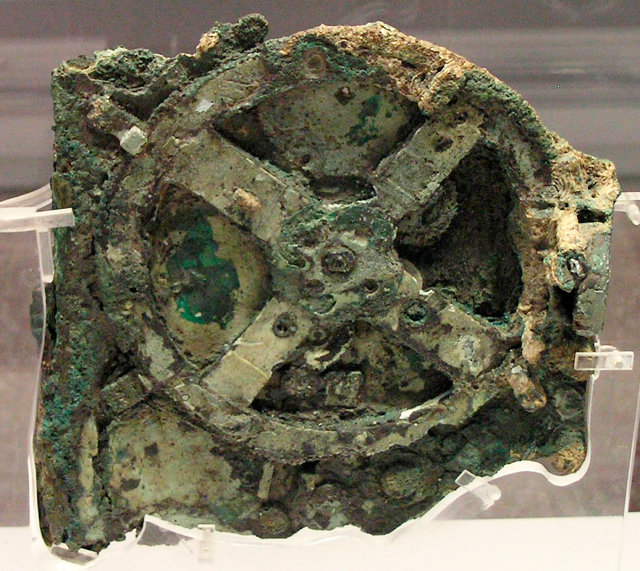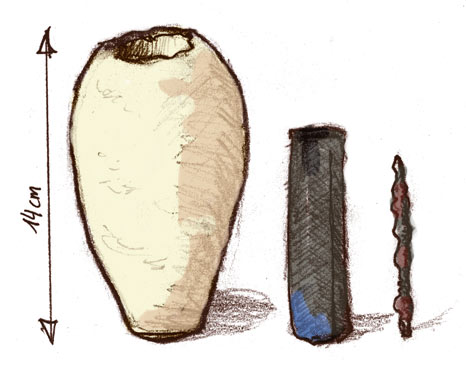It looks like you're using an Ad Blocker.
Please white-list or disable AboveTopSecret.com in your ad-blocking tool.
Thank you.
Some features of ATS will be disabled while you continue to use an ad-blocker.
share:

We often think of our distant ancestors--and not for nothing --as superstitious savages who worshipped the sun and the moon and lived in ignorance of the finer workings of the universe.
I thought I'd share with a fresh look and interesting perspective. It covers many of the things we've discussed over the yeas here at ATS. I appreciate the fact that the writer does a wonderful job of taking a different look and compiles what many of us have suspected as a somewhat lost Ancient past. No, you wont find a microchip buried in some tomb. What you will notice is that he pulls together many well known items that when presented separately seem just interesting curiosities but when presented in this manner creates a very intriguing picture of our past.
COMPUTERS

“The more we learn about it the more ingenious it seems,” says Alex Roland, a professor emeritus of history of technology and military history at Duke University. “It was indeed a kind of computer.”
LASERS

They weren’t quite lasers as we know them, but the ancients definitely had a concept--and likely some prototypes--of directed energy rays. Legend has it that the same Archimedes who built ancient computers used a set of mirrors to burn enemy Roman ships when they approached his native city of Syracuse in 214 BCE. Recent experiments have shown that this was possible, but critics say it was hardly very practical, since it would only work in ideal weather and under carefully controlled conditions.
ROBOTS
"It allows you to program a robot to move forwards, to move backwards, to stop and to turn, and those are exactly the same sorts of commands used in modern robots,” Noel Sharkey, a professor of artificial intelligence and robotics at the University of Sheffield, UK, told the New Scientist.
So called Primitive man was not so Primitive after all, Not to mention the fact these are just a small sampling of the things we've found over the past couple of hundred years. Nor does it take into account possible now submerged Cultures or Civilizations along those now flooded ice age coastlines. Nor theirs or our presently accepted cradle Civs sometimes questionable and murky development phase either. Having said that, they having not as of yet finding the proverbial a microchip in a tomb doesn't mean they wont find something very interesting that is not known presently in the near future. Stay tuned.
Note: I'm a firm believer that Mankind has stumbled a few times in prehistory before this present reality, Gobekli Tepe? Ancient Aliens? Possible, But how Probable? Until we have concrete proof I'll remain an open minded skeptic....
edit on 18-2-2014 by SLAYER69 because: (no reason given)
I would wager to bet that the average person in those days was far more intelligent in terms of brain capacity than the hordes of consumerist zombies
droning around in modern times. So I definitely have an open mind to these elaborate possibilities. Fascinating stuff. Lets also not forget the
Baghdad Battery. The ancient Babylonians perhaps weren't just the savage heathens they are made out to be either:

By Ironie (Own work) [CC-BY-SA-2.5 (creativecommons.org...)], via Wikimedia Commons

By Ironie (Own work) [CC-BY-SA-2.5 (creativecommons.org...)], via Wikimedia Commons
edit on
kAmerica/ChicagoAmerica/Chicago22014b39America/ChicagoTue, 18 Feb 2014 09:11:39 -0600v by keenobservernet because: (no reason given)
I was listening to Startalk the other day. The topic of could other intelligent species have evolved in the past only to have been gone so long that
all trace has been removed. Neil degrasse Tyson asked a geology buddy how long would it take for ALL trace of us to disappear. His opinion was a
billion years. Which wouldn't fit the fossil record.
This is kinda a false point to me. The billion years is for our society to disappear. What about a group of intelligent reptiles who never made it pat the hunter gatherer stage? How long before all trace of the geeks Romans or sumarians are gone?
It's my opinion that we've gotten to the tech lvl of say the Romans in forgotten chapters in history. Maybe more then once. The 800,000 years we've been around is a long time
This is kinda a false point to me. The billion years is for our society to disappear. What about a group of intelligent reptiles who never made it pat the hunter gatherer stage? How long before all trace of the geeks Romans or sumarians are gone?
It's my opinion that we've gotten to the tech lvl of say the Romans in forgotten chapters in history. Maybe more then once. The 800,000 years we've been around is a long time
I love that story of Archimedes burning that fleet down with the rays of the sun, I watched a show where they demonstrated the process too see if it
would work and the ships they tested on where soon beneath the blue!
I really do wish we had more Antikythera mechanism type machines to examine, I read once a theory that all of that knowledge how to build such devices was all put into the Library of Alexander for others to study etc, and we all know how that went
The Greeks were using automatic doors and had slot machines before our lazy generation chimed up.
I cannot watch that video as no god damned sound on my pc at the moment, but know I shall when the right time strikes!
Top job Slayer of the 69
I really do wish we had more Antikythera mechanism type machines to examine, I read once a theory that all of that knowledge how to build such devices was all put into the Library of Alexander for others to study etc, and we all know how that went
The Greeks were using automatic doors and had slot machines before our lazy generation chimed up.
I cannot watch that video as no god damned sound on my pc at the moment, but know I shall when the right time strikes!
Top job Slayer of the 69
Personaly I suspect classical era civilizations never hit an industrial revolution because of there over reliance on slavery, as such most labour
saving technologies were relegated to the world of novelty.
reply to post by Bellor
That's an interesting reply
I hadnt thought of it in that manner before.
The more I think of it the more it makes sense
That's an interesting reply
I hadnt thought of it in that manner before.
The more I think of it the more it makes sense
Bellor
Personaly I suspect classical era civilizations never hit an industrial revolution because of there over reliance on slavery, as such most labour saving technologies were relegated to the world of novelty.
You hit right on the nose
Its pretty fascinating, they essential had everything they needed in there tech tree, they were using coal, oil, they had steam power, turbine
technology, mills, air/water pumps, calipers, gears, the Greeks were even using water hoses driven by double action piston pumps to use for fire
fighting in 100BC. Wealthy Greek cities were very very advanced.
It has even been speculated they were building rudimentary railways as early as 600BC
I can only imagine what the world could be like now had they achieved an industrial revolution over 2,000 years ago. Chances are we would already be traveling the stars by now, its a sad realization to come to terms with the fact that as ingenious as classical man was, he was sadly just a man and as such bound by all the petty social trappings that still hold us back even to this day .
It has even been speculated they were building rudimentary railways as early as 600BC
I can only imagine what the world could be like now had they achieved an industrial revolution over 2,000 years ago. Chances are we would already be traveling the stars by now, its a sad realization to come to terms with the fact that as ingenious as classical man was, he was sadly just a man and as such bound by all the petty social trappings that still hold us back even to this day .
SLAYER69
THE FIRST COMPUTERS, LASERS, ROBOTS, AND MORE: ANCIENT INNOVATIONS FROM OUR DISTANT ANCESTORS
We often think of our distant ancestors--and not for nothing --as superstitious savages who worshipped the sun and the moon and lived in ignorance of the finer workings of the universe.
I thought I'd share with a fresh look and interesting perspective. It covers many of the things we've discussed over the yeas here at ATS. I appreciate the fact that the writer does a wonderful job of taking a different look and compiles what many of us have suspected as a somewhat lost Ancient past. No, you wont find a microchip buried in some tomb. What you will notice is that he pulls together many well known items that when presented separately seem just interesting curiosities but when presented in this manner creates a very intriguing picture of our past.
COMPUTERS
“The more we learn about it the more ingenious it seems,” says Alex Roland, a professor emeritus of history of technology and military history at Duke University. “It was indeed a kind of computer.”
LASERS
They weren’t quite lasers as we know them, but the ancients definitely had a concept--and likely some prototypes--of directed energy rays. Legend has it that the same Archimedes who built ancient computers used a set of mirrors to burn enemy Roman ships when they approached his native city of Syracuse in 214 BCE. Recent experiments have shown that this was possible, but critics say it was hardly very practical, since it would only work in ideal weather and under carefully controlled conditions.
ROBOTS
"It allows you to program a robot to move forwards, to move backwards, to stop and to turn, and those are exactly the same sorts of commands used in modern robots,” Noel Sharkey, a professor of artificial intelligence and robotics at the University of Sheffield, UK, told the New Scientist.
So called Primitive man was not so Primitive after all, Not to mention the fact these are just a small sampling of the things we've found over the past couple of hundred years. Nor does it take into account possible now submerged Cultures or Civilizations along those now flooded ice age coastlines. Nor theirs or our presently accepted cradle Civs sometimes questionable and murky development phase either. Having said that, they having not as of yet finding the proverbial a microchip in a tomb doesn't mean they wont find something very interesting that is not known presently in the near future. Stay tuned.
Note: I'm a firm believer that Mankind has stumbled a few times in prehistory before this present reality, Gobekli Tepe? Ancient Aliens? Possible, But how Probable? Until we have concrete proof I'll remain an open minded skeptic....
edit on 18-2-2014 by SLAYER69 because: (no reason given)
Read the wikipedia on the Lycurgus Cup, when you read it you get the impression that they are saying the people didn't understand what they where doing and by luck the glass had nanoparticles of gold and silver and it just happened to work. This is an example of opening an egyptian tomb and finding a jet engine inside it and millions of people see that one is in there. So they can't say that it wasn't a jet engine and they can't say it wasn't in there, so what do they do. They say that it was built but crudely and they didn't know what they where building etc etc.. Basically saying it was an accident and they couldn't have come up with it.
That cup is a masterpiece of work that shouldn't have been made back then by their hypothesis. Slayer I think in the near future something is going to be found that will remove all doubt that we are survivors of an ancient world spanning civilization that was destroyed and had to relearn.
I've often wondered where we would be if past civilizations had been able to keep going, and not eventually fall.
You do not have to go back to over 10,000 years and speculate about it. It's in our recorded history.
Look at the Roman empire: we lost many things that they had invented and had to be "re-invented" again down the road, concrete (or was it cement?) being one of them.
Just think of how advanced we would be today if those civilizations had been able to continue, and had not collapsed due to wars, invasions, etc.
You do not have to go back to over 10,000 years and speculate about it. It's in our recorded history.
Look at the Roman empire: we lost many things that they had invented and had to be "re-invented" again down the road, concrete (or was it cement?) being one of them.
Just think of how advanced we would be today if those civilizations had been able to continue, and had not collapsed due to wars, invasions, etc.
-----Thread Update-----

Two thousand ago, the Thomas Edison of the ancient world lived in Alexandria, Egypt where he tinkered, built and wrote about some of the most amazing and whimsical machines the pre-industrial world had ever seen.
Hero
Also called Heron, the Greek engineer and mathematician Hero is believed to have lived in the 1st century and was active in Alexandria between 60 and 70 AD. A prolific writer as well as inventor, Hero is credited with authorship of several manuscripts including Automata, thePneumatica, the Dioptra, the Catoprica and the Mechanica.
Many of Hero's writings sound more like lecture notes, and combined with the fact that he was an avowed pupil of Ctesibius (the man believed by many to be the first head of the Museum of Alexandria), most assume thatHero taught there as well.
The Museum has been characterized as an:
Unusual blend of pure science with engineering . . . [and] applied technology . . . [where] much can be discovered through experiment.
This is a related topic article I thought some would be interested.
Enjoy...
edit on 1-3-2014 by SLAYER69 because: (no reason given)
reply to post by Bellor
The American Civil War provides an example of the difference. The South never had a hope against the North because it had next to no industrial plant or advanced technology. Why didn't they have it? Because they had slaves to do that stuff for them.
The American Civil War provides an example of the difference. The South never had a hope against the North because it had next to no industrial plant or advanced technology. Why didn't they have it? Because they had slaves to do that stuff for them.
ArtemisE
I was listening to Startalk the other day. The topic of could other intelligent species have evolved in the past only to have been gone so long that all trace has been removed. Neil degrasse Tyson asked a geology buddy how long would it take for ALL trace of us to disappear. His opinion was a billion years. Which wouldn't fit the fossil record.
This is kinda a false point to me. The billion years is for our society to disappear. What about a group of intelligent reptiles who never made it pat the hunter gatherer stage? How long before all trace of the geeks Romans or sumarians are gone?
It's my opinion that we've gotten to the tech lvl of say the Romans in forgotten chapters in history. Maybe more then once. The 800,000 years we've been around is a long time
His geology friend may have been hedging his bets slightly...the answer he gave was probably accurate, but not in a way most people would naturally think so.
The operative words in the question were 'ALL TRACES'..now, all traces would indeed take a very long time to completely disappear, at least something on the order of hundreds of millions of years, so a nice round billion years is fine.
The traces of our current societies and evidence of our technology wouldn't be in the form of solid objects such as computer chips, buildings and monuments, TV sets, an engine or parts of a vehicle or ship, or even large earthworks like canals or foundations for skyscrapers...these would all be VERY long gone by at the most 100,000 years.
What would remain to be discovered though, which would show our existence to a hypothetical archaeologist digging or scanning for ancient societies a billion years into the future would be the strange concentrations of mineral remains of our civilisation.
If he or she were to be fortunate enough to happen to be digging (by then, more likey scanning) in an area near to one of our large modern cities are now, long after the buildings had crumbled to dust, our scientist digging away might find deep and unexplainable accumulations of silica, meters deep layers of aggregates sandwitched with iron oxide layers that really ought not to be present in such concentration if he were looking at natural geology alone.
These would of course be the ancient remains of glass from our buildings and skyscrapers, the steel from our buildings skeletons and structural frames and of course from our millions of vehicles and the concrete used in foundations, roads and claddings.
Depending on the area and when and how suddenly our society winked out, they might also find strange concentrations of gold, lithium and silicon..all from our electronic devices, jewellery and batteries.
So really 'ALL TRACES' are going to be a long time disappearing, if ever at all.
The question ought to have been something like "How long would it have taken for the obviously recognisable aspects of Humanity, like foundations, earthworks, ancient buildings and tools, waterways and vehicular infrastructure and so on to cease being obviously recognisable as part of a technological civilisation"?
The answer to that particular question would have been a LOT earlier than a billion years.
Kinda makes looking for a VERY long gone Earth civilisation more a question of looking at unusual Geology, rather than archaelogy and looking for actual artifacts we can hold in our hands and put into a museum.
edit on 1-3-2014 by MysterX because: added info
SLAYER69
-----Thread Update-----
The Amazing Ancient Machines of Hero of Alexandria
Two thousand ago, the Thomas Edison of the ancient world lived in Alexandria, Egypt where he tinkered, built and wrote about some of the most amazing and whimsical machines the pre-industrial world had ever seen.
Hero
Also called Heron, the Greek engineer and mathematician Hero is believed to have lived in the 1st century and was active in Alexandria between 60 and 70 AD. A prolific writer as well as inventor, Hero is credited with authorship of several manuscripts including Automata, thePneumatica, the Dioptra, the Catoprica and the Mechanica.
Many of Hero's writings sound more like lecture notes, and combined with the fact that he was an avowed pupil of Ctesibius (the man believed by many to be the first head of the Museum of Alexandria), most assume thatHero taught there as well.
The Museum has been characterized as an:
Unusual blend of pure science with engineering . . . [and] applied technology . . . [where] much can be discovered through experiment.
This is a related topic article I thought some would be interested.
Enjoy...edit on 1-3-2014 by SLAYER69 because: (no reason given)
Is it just me...or does Hero bear a striking resemblance to Richard Dreyfuss?
Perhaps we all do indeed go around and around.
reply to post by SLAYER69
Your thread reminded me of Talos, the ancient Greek automaton made of bronze. I went to find you a link, but it turns out, there were quite a few?
Wiki- Automaton
Your thread reminded me of Talos, the ancient Greek automaton made of bronze. I went to find you a link, but it turns out, there were quite a few?
There are many examples of automata in Greek Mythology: Hephaestus created automata for his workshop; Talos was an artificial man of bronze; Daedalus used quicksilver to install voice in his moving statues; King Alkinous of the Phaiakians employed gold and silver watchdogs; the Caucasian artificial eagle tortured Prometheus.[4]
Wiki- Automaton
SLAYER69
So called Primitive man was not so Primitive after all...
It takes either a lot of nerve or a lot of ignorance to refer to the ancient Greeks as "primitive man," Slayer.
Harte
Bellor
Personaly I suspect classical era civilizations never hit an industrial revolution because of there over reliance on slavery, as such most labour saving technologies were relegated to the world of novelty.
That's an excellent observation.
Having the ability means nothing without the will, and the means. Romans were using steam power for toys, took a few thousand years to realize you hook a wheel and belt to that steam engine you have yourself an industrial revolution. They had enough slave labor that either nobody cared to put 2 and 2 together, or someone did but a steam engine just wasn't seen as a value over a slave.
I totally agree the ancient world was far more advanced than we give them credit for, but I don't think that means they had an industrial high tech civilization, just that they came up with more clever, elegant, and simple means of accomplishing the same things as we do today.
hoghead cheese
SLAYER69
THE FIRST COMPUTERS, LASERS, ROBOTS, AND MORE: ANCIENT INNOVATIONS FROM OUR DISTANT ANCESTORS
We often think of our distant ancestors--and not for nothing --as superstitious savages who worshipped the sun and the moon and lived in ignorance of the finer workings of the universe.
I thought I'd share with a fresh look and interesting perspective. It covers many of the things we've discussed over the yeas here at ATS. I appreciate the fact that the writer does a wonderful job of taking a different look and compiles what many of us have suspected as a somewhat lost Ancient past. No, you wont find a microchip buried in some tomb. What you will notice is that he pulls together many well known items that when presented separately seem just interesting curiosities but when presented in this manner creates a very intriguing picture of our past.
COMPUTERS
“The more we learn about it the more ingenious it seems,” says Alex Roland, a professor emeritus of history of technology and military history at Duke University. “It was indeed a kind of computer.”
LASERS
They weren’t quite lasers as we know them, but the ancients definitely had a concept--and likely some prototypes--of directed energy rays. Legend has it that the same Archimedes who built ancient computers used a set of mirrors to burn enemy Roman ships when they approached his native city of Syracuse in 214 BCE. Recent experiments have shown that this was possible, but critics say it was hardly very practical, since it would only work in ideal weather and under carefully controlled conditions.
ROBOTS
"It allows you to program a robot to move forwards, to move backwards, to stop and to turn, and those are exactly the same sorts of commands used in modern robots,” Noel Sharkey, a professor of artificial intelligence and robotics at the University of Sheffield, UK, told the New Scientist.
So called Primitive man was not so Primitive after all, Not to mention the fact these are just a small sampling of the things we've found over the past couple of hundred years. Nor does it take into account possible now submerged Cultures or Civilizations along those now flooded ice age coastlines. Nor theirs or our presently accepted cradle Civs sometimes questionable and murky development phase either. Having said that, they having not as of yet finding the proverbial a microchip in a tomb doesn't mean they wont find something very interesting that is not known presently in the near future. Stay tuned.
Note: I'm a firm believer that Mankind has stumbled a few times in prehistory before this present reality, Gobekli Tepe? Ancient Aliens? Possible, But how Probable? Until we have concrete proof I'll remain an open minded skeptic....
edit on 18-2-2014 by SLAYER69 because: (no reason given)
Read the wikipedia on the Lycurgus Cup, when you read it you get the impression that they are saying the people didn't understand what they where doing and by luck the glass had nanoparticles of gold and silver and it just happened to work. This is an example of opening an egyptian tomb and finding a jet engine inside it and millions of people see that one is in there. So they can't say that it wasn't a jet engine and they can't say it wasn't in there, so what do they do. They say that it was built but crudely and they didn't know what they where building etc etc.. Basically saying it was an accident and they couldn't have come up with it.
That cup is a masterpiece of work that shouldn't have been made back then by their hypothesis. Slayer I think in the near future something is going to be found that will remove all doubt that we are survivors of an ancient world spanning civilization that was destroyed and had to relearn.
I'm going to have to disagree with you there. There is absolutely no implication that they intended the cup to have any of the properties it does, other than the obvious aesthetic ones.
If I drop a dinner plate and it breaks into a cool design, it doesn't imply I was attempting for that design in the first place. Dichro glass is a rather simple thing, you have pot head hippies making and working it even today for use in "tobacco pipes" simply because it's sparkly and looks cool.
I understand the desire to give credit to the ancients, but it seems a bit insulting actually to say they couldn't have made it without some sort of additional knowledge or skill. Patience, creativity, and care go a longer than advanced knowledge/tech sometimes.
The art of cooking has been around for a long time, we realized when you brown meat it tastes better. That doesn't mean acient people understood the reactions going on, and the whys and hows, they just knew that if you browned meat, or caramelized things it created new and delicious flavors.
Mixing gold and silver powder into glass is nowhere near the level of complexity you imply with your jet engine comparison. Why do you think it's so impossible a glass worker of the time decided to mix gold or silver powder into their glass just to see how it looks? You do realize a great many, if not most of our huge discoveries have been by accident, not knowledgeable intent.
edit on 3-3-2014 by James1982 because: (no reason
given)
new topics
-
Just Came Across These Unusual Old UFO Pics
Aliens and UFOs: 40 minutes ago -
LA Mayor Bass Demanded $49M in Additional LAFD Cuts One Week Before Wildfires
Mainstream News: 2 hours ago -
Sepultura - Territory - With New Drummer Greyson Nekrutman
Music: 3 hours ago -
Carry On!
Short Stories: 3 hours ago -
This should be plastered all over the airwaves
Mainstream News: 9 hours ago -
Oh, Good Gosh. “Kremlin Warns Stay Away from Greenland.”
World War Three: 11 hours ago -
Archbisop Vigano Warns of Deep State and Deep Church
New World Order: 11 hours ago
top topics
-
This should be plastered all over the airwaves
Mainstream News: 9 hours ago, 21 flags -
Archbisop Vigano Warns of Deep State and Deep Church
New World Order: 11 hours ago, 15 flags -
LA Mayor Bass Demanded $49M in Additional LAFD Cuts One Week Before Wildfires
Mainstream News: 2 hours ago, 13 flags -
Oh, Good Gosh. “Kremlin Warns Stay Away from Greenland.”
World War Three: 11 hours ago, 11 flags -
A Flash of Beauty: Bigfoot Revealed ( documentary )
Cryptozoology: 17 hours ago, 8 flags -
Carry On!
Short Stories: 3 hours ago, 2 flags -
Just Came Across These Unusual Old UFO Pics
Aliens and UFOs: 40 minutes ago, 2 flags -
Sepultura - Territory - With New Drummer Greyson Nekrutman
Music: 3 hours ago, 1 flags
active topics
-
LA Mayor Bass Demanded $49M in Additional LAFD Cuts One Week Before Wildfires
Mainstream News • 13 • : DAVID64 -
This should be plastered all over the airwaves
Mainstream News • 52 • : fringeofthefringe -
Just Came Across These Unusual Old UFO Pics
Aliens and UFOs • 1 • : gort69 -
Los Angeles brush fires latest: 2 blazes threaten structures, prompt evacuations
Mainstream News • 349 • : AlroyFarms -
Mood Music Part VI
Music • 3782 • : lilzazz -
Judge rules president-elect Donald Trump must be sentenced in 'hush money' trial
US Political Madness • 117 • : WeMustCare -
Dr. Demento
Music • 15 • : GotterDameron23 -
Trump says ownership of Greenland 'is an absolute necessity'
Other Current Events • 158 • : matafuchs -
Archbisop Vigano Warns of Deep State and Deep Church
New World Order • 8 • : DontTreadOnMe -
A Flash of Beauty: Bigfoot Revealed ( documentary )
Cryptozoology • 7 • : ColeYounger2
